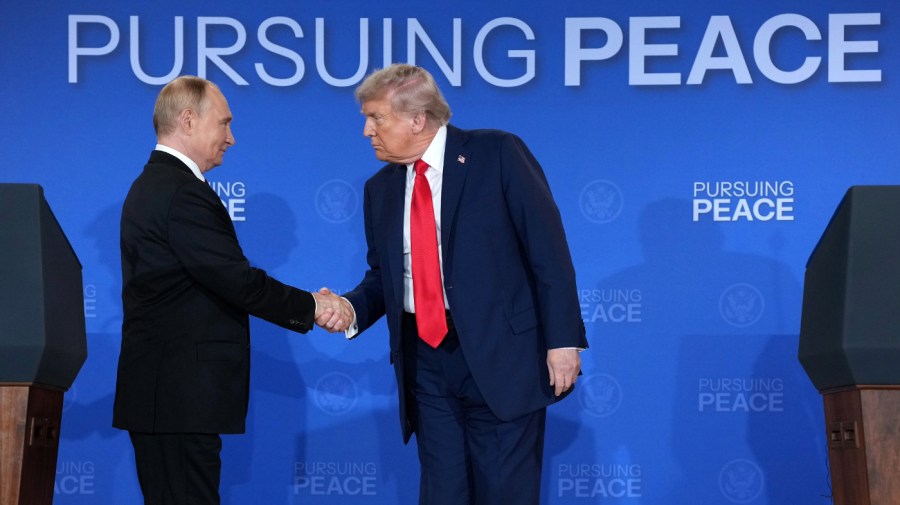Trump’s U-turn on Ukraine could lead to the end of Putin’s reign in Russia

Last week, President Trump’s relatively pro-Russia Ukraine policy swerved dramatically — at least, on a rhetorical level. He said the Kyiv government “can win all of Ukraine back in its original form, territory Russia has invaded [and] maybe even go further than that.”
It was a far cry from his position during his campaign, and consistently since then, that the price for “peace” in Ukraine may be to surrender to Vladimir Putin all areas of the country Russia has already occupied and significant parts that it has not yet conquered.
Trump’s policy turnaround is all the more surprising given his ongoing acquiescence when Putin defied his pleas, deadlines and ultimatums to end the Ukraine war. His almost obsequious treatment of Putin during their Alaska meeting was as much of a national embarrassment as his and JD Vance’s tag-team bullying of Volodymyr Zelensky in February.
Trump’s latest demand, issued more than a month ago, was that Putin agree to a Ukraine ceasefire and negotiations within two weeks. Zelensky had already agreed. But, like all Trump’s other deadlines for Russia, it came and went, with no Putin compliance and no real consequences from Trump.
It is almost as if Putin takes pleasure in leading Trump on to boast of his “great relationship” with the Russian leader, only to spurn and mock him each time with a new, more devastating attack on Ukrainian cities and civilians. So far, however, since his startling new remarks, Trump has taken no concrete action to suggest a substantive change in his approach to either Russia or Ukraine.
He reportedly did indicate to Zelensky in recent days that he is “open” to providing Ukraine with the long-range weapons it has requested for months to enable it to strike more deeply into Russian territory. But, though Trump now recommends the approach for Ukraine, he did not actually commit to deliver the necessary weapons, perhaps intending either to consult with Putin or to give him yet another “last chance” to cooperate.
It could well be that Trump’s tough new language is merely another gambit to get Putin to the negotiating table. If so, Putin knows well how to deal with the tactic: make some rhetorical gesture in Trump’s direction to relieve the pressure, then revert back to his stalling strategy. It is a replay of the “fighting while talking” technique perfected by Kim Il Sung, North Korea’s founding dictator, to prolong the Korean War by almost three years, an approach followed successfully by Ho Chi Minh’s North Vietnamese Communists to conquer South Vietnam two decades later.
Another theory to explain Trump’s apparent U-turn on Ukraine is that it is a smokescreen to hide a decision to wash his hands of the entire matter. Trump previously threatened to do just that and let Ukraine and Russia “fight it out,” with a strong implication that he would end U.S. military support for the Zelensky government. Given Russia’s huge manpower advantage and Putin’s utter disregard for the numbers of young Russians he destroys — joined recently by young North Koreans — such a course by the U.S. would severely damage Ukraine’s prospects in a protracted war of attrition.
Rather than permanently cut off support for Ukraine, which he twice suspended in recent weeks, Trump has already begun a phase-out of direct U.S. military aid and a transition to encourage NATO members’ purchase of high-end U.S. weapons — “at full price” — for transfer to Ukraine. To Trump’s way of thinking, he will have finessed the “forever war” issue and be absolved of keeping America in yet another. He could portray it as a mere arms sale, a commercial transaction, rather than a matter of U.S. national security or enforcement of international law and morality.
Trump has made it clear he wants Europe to carry the burden of helping Ukraine’s defense. After months of pressuring territorial concessions to end the war, Trump now offers contrary advice against Russia, which he calls “a paper tiger”. He says he wants Ukraine not only to stay in the fight but to eject Russia from all of Ukraine, reversing both the 2014 and 2022 invasions. Most startling, after Trump followed Joe Biden’s counter-productive policy of denying Ukraine the weapons to strike strategic targets deep inside Russia, he seems to be advocating a much more assertive strategy. “I now understand the Ukraine/Russia military and economic situation,” Trump posted on X. “Putin and Russia are in BIG Economic trouble, and this is the time for Ukraine to act.”
If Trump is seriously advocating Russia’s defeat and ejection from Ukraine after it has sacrificed a million young men and suffered enormous costs to Russia’s economy, his national security team must surely have advised him that Putin’s regime will be in severe jeopardy. It’s quite possible he could be removed from power. Given that contingency, Trump will hopefully follow his own advice to take advantage of the unique opportunity presented by Putin’s precarious strategic situation.
This the time for the president to act, and render whatever moral and diplomatic support the U.S. can to facilitate peaceful regime change in Russia. It would make Russia great again by putting it back on the path to normalization Mikhail Gorbachev and Boris Yeltsin started 30 years ago, before Putin arrived and wasted those years on his murderous quest to revive the dark era of the Soviet/Russian Empire. Such an earth-shaking development would present an important cautionary lesson for Xi Jinping and Kim Jong Un — and greatly enhance Trump’s prospects for the Nobel Peace Prize he openly covets.
Joseph Bosco served as China country director for the secretary of Defense from 2005 to 2006 and as Asia-Pacific director of humanitarian assistance and disaster relief from 2009 to 2010. He is a nonresident fellow at the Institute for Corean-American Studies, a member of the advisory board of the Global Taiwan Institute and member of the advisory board of The Vandenberg Coalition.